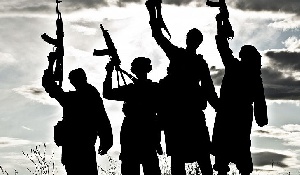 In the last two years, the world has experienced an upsurge in a
In the last two years, the world has experienced an upsurge in a
Global changes have an effect on local societies and African countries, including Ghana, need to identify and deal with individuals and rings within their jurisdictions which can be used as agents for terrorist attacks, security analyst Nana Owusu Sekyere has observed.
He was contributing to a discussion on Class FM’s World Affairs on the Westminster terrorist attack on Wednesday March 22, which led to four deaths.
Terrorist group ISIS claimed responsibility but the attacker was a Kent-born 52-year-old man identified as Khalid Masood.
The attack left 50 people injured, with 31 receiving hospital treatment. Two are in critical condition; one has life-threatening injuries.
Mr Sekyere, who was trying to connect the dots, told show host Dr Etse Sikanku on Friday, March 24: “We must look at the possibility of home-grown terrorist organisations or home-grown terrorist individuals. Now they are looking at a more easy way because of a cut in their financial flow.”
For him, identifying and dealing with home-grown terrorist individuals or cells would be a step forward in averting the possibility of such a calamity in Ghana or on the continent.
“In the last two years, the world has experienced an upsurge in a ‘lone wolf’ modus operandi with respect to terrorism. France, Germany, Belgium, United States and London recently (22/3/2017) have all had their fair share of this terror style,” he noted.
He explained that terrorist organisations now fall on local individuals to perpetrate such acts which, hitherto, would have been carried out by a whole group.
“This approach is much elusive and effective,” he noted, adding: “It is difficult to identify who the next ‘lone wolf’ is.”
According to him, the approach “is precise and meets the objective of the mother terrorist organisation though it is carried out by an individual”.
He admonished Ghanaian authorities to learn from the trend.
Mr Sekyere further stated: “We may have to build capacity within our community policing, work closely with associations and organisations by way of securitising their activities, share timely information among relevant stakeholders, adopt changing security trends, a public awareness of global insecurities, commit to a stringent monitoring and evaluation regime and financially commit to all security efforts aimed at mitigating national disasters.”